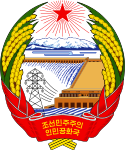National Defence Commission
This article needs additional citations for verification. (May 2010) |
 |
|---|
|
|
| DPRK National Defence Commission | |
| Chosŏn'gŭl | 조선민주주의인민공화국 국방위원회 |
|---|---|
| Hancha | 朝鮮民主主義人民共和國國防委員會 |
| Revised Romanization | Joseon minjujuui inmin gonghwaguk gukbang wiwonhoe |
| McCune–Reischauer | Chosŏn minjujuŭi inmin konghwaguk kukpang wiwŏnhoe |
Template:Contains Korean text The National Defence Commission of the Democratic People's Republic of Korea (NDC) is defined by the 1998 constitution as "the highest guiding organ of the military and the managing organ of military matters". The Chairman of the National Defence Commission controls the armed forces and, in this state where the military dominates, is the most powerful position in the country and was held by Kim Jong-il up until his death. Per the 2016 Constitution, the commission was replaced by the State Affairs Commission.
History
The National Defence Commission was created in 1972, with a group of commissions subordinate to the Central People's Committee, as part of the 1972 DPRK Constitution. The first National Defence Commission consisted of four members (Kim Il-sung; Choe Hyon; O Jin-u; and O Paek Ryong). The NDC was chartered in Chapter VII, Article 105:
The Central People's Committee establishes a Domestic Policy Commission, a Foreign Policy Commission, a National Defence Commission, a Justice and Security Commission and other respective commissions to assist in its work.
The National Defence Commission, though nominally under the Supreme People's Assembly, was confirmed as the highest state body, with ultimate executive power (including responsibility for the armed forces) resting with its chairman, in 1998 through a constitutional amendment.
The Fifth Session of the 12th Supreme People's Assembly, held on 13 April 2012, proclaimed Kim Jong-il as the "Eternal Chairman of the National Defence Commission". The Constitution was revised to replace it with the First Chairman post, with the late leader's son and successor Kim Jong-un appointed to the new position.
Kim Jong-un has taken over as the First Chairman of the Commission, this organization seems to have faded somewhat into the background. It is a mouthpiece on certain issues, especially focused on inter-Korean relations, and is the source for announcements regarding tests of critical defense systems. Also, as of early 2014, there have been no reported meetings of the NDC.
Per the 4th plenary session of the Supreme People's Assembly in June of 2016 the commission was official replaced by the State Affairs Commission.
Powers and responsibilities
Article 106 of the Constitution of North Korea states that the National Defence Commission is "the supreme national defence guidance organ of state sovereignty". Article 109 of the Constitution states that the NDC’s powers are to:[1]
- Establish important policies of the state for carrying out the military-first revolutionary line.
- Guide the overall armed forces and defense-building work of the state.
- Supervise the status of executing the orders of the chairman of the DPRK NDC and the decisions and directives of the NDC, and establish relevant measures.
- Rescind the decisions and directives of state organs that run counter to the orders of the chairman of the NDC and to the decisions and directives of the Commission.
- Establish or abolish central organs of the national defense sector.
- Institute military ranks and promote officers above the general-grade or admiral-grade officer rank.
As a defense issues guider and coordinator, the security organizations in North Korea are subordinate to the Commission and among them are the Korean People's Army, the Ministry of People's Armed Forces and the State Security Department and the Ministry of People's Security.
Structure
Among the departments that are known in the NDC are:[2]
- Administration Department
- Foreign Affairs Department
- Reconnaissance General Bureau
- Policy Department
Security agencies and organizations that subordinated to the Commission:
- Ministry of People's Armed Forces
- Ministry of People's Security
- Korean People's Army
- State Security Department
Composition of the DPRK NDC as of 8 September 2015
These were the members of the DPRK NDC after Pak Yong-sik was appointed Minister of the People's Armed Forces on July 11[3] after Hyon Yong-chol was executed on May 12 of 2015[4] ending a 2-month-long vacancy in the post.
- First Chairman: Kim Jong-un
- Vice Chairmen:
- Vice Marshal of the KPA Hwang Pyong-so
- Vice Marshal of the KPA Ri Yong-mu
- General of the Army O Kuk-ryol
- Members of the Commission:
- General of the Army Pak Yong-sik, Minister of the People's Armed Forces
- Pak To-chun, WPK Secretary for Military Industry
- General of the Army Kim Won-hong, Minister of State Security
- General of the Army Choe Pu-il, Minister of People's Security
- General of the Army Ri Pyong-chol, Vice Chief of General Staff
- Jo Chun-ryong, Director of WPK Machine-Building Industry Department
See also
References
- ^ Article 109 of the Constitution of North Korea
- ^ CORI Country ReportDemocratic People’s Republic of Korea, October 2012, p. 13
- ^ http://www.upi.com/Top_News/World-News/2015/07/11/Gen-Pak-Yong-Sik-confirmed-as-new-North-Korea-defense-minister/7091436629935
- ^ http://www.reuters.com/article/2015/05/13/us-northkorea-purge-idUSKBN0NY01J20150513
- Kirby, Michael Donald; Biserko, Sonja; Darusman, Marzuki (7 February 2014). "Report of the detailed findings of the commission of inquiry on human rights in the Democratic People's Republic of Korea - A/HRC/25/CRP.1". United Nations Human Rights Council. Archived from the original on Feb 27, 2014.
{{cite journal}}: Cite journal requires|journal=(help); Unknown parameter|deadurl=ignored (|url-status=suggested) (help)
Further reading
- Robbers, Gerhard (2007). "North Korea: The National Defense Commission". Encyclopedia of world constitutions. Infobase Publishing. p. 490. ISBN 978-0-8160-6078-8.
